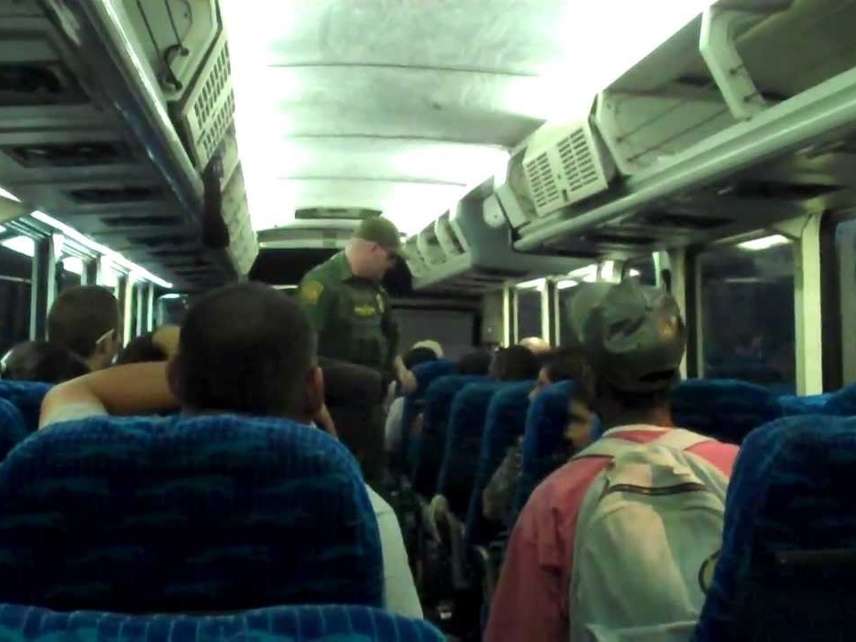Greyhound Should Just Say No to the Border Patrol's Bus Sweeps
The company has no legal obligation to let alien hunters harass its customers unless they have a warrant or probable cause.

Across the country, U.S. Border Patrol agents routinely board intercity buses and interrogate passengers with brown skin or foreign accents, asking for proof that they are in the country legally. These warrantless inspections, which have become more common since Donald Trump took office, are intimidating, inconvenient, and humiliating, and they often lead to the erroneous detention of U.S. citizens and legal residents who can't immediately document their status. Critics of Trump's crackdown on illegal immigration say there is an easy way to end these "papers, please" parades up and down the aisles: The companies that operate the buses can just say no.
Last week Rep. Joaquin Castro (D-Texas) and 22 other members of Congress sent Greyhound Lines CEO David Leach a letter urging him to stop letting Border Patrol agents on the company's buses unless they have a warrant or probable cause. "By granting consent to CBP [Customs and Border Protection] agents to board buses to inquire about immigration status, Greyhound exposes its passengers to frequent violations of their constitutional rights to be free from warrantless searches and seizures, racial profiling, and harassment," Castro et al. wrote. "According to Greyhound's website, the company prides itself on 'providing safe, enjoyable and affordable travel to nearly 18 million passengers each year in the United States and Canada.' We do not see how this mission comports with authorizing dragnet CBP searches of Greyhound's passengers."
Greyhound seems to agree but maintains that it is powerless to resist the Border Patrol's demands. The company does not "support or coordinate these searches," a spokeswoman told The Washington Post this week. "Nor are we happy about them….We have started conversations with the Border Patrol to determine if there is anything that can be done to balance the enforcement of federal law with the dignity and privacy of our valued customers." Castro et al. say such conversations are unnecessary, because Greyhound has no legal obligation to allow bus searches without a warrant or probable cause.
It is not hard to see how the company might have gotten the opposite impression. A federal law, 8 USC 1357, says Border Patrol agents "shall have power without warrant…to board and search for aliens any vessel within the territorial waters of the United States and any railway car, aircraft, conveyance, or vehicle," provided the search occurs "within a reasonable distance from any external boundary of the United States," defined as a 100-mile zone that happens to include about two-thirds of the country's population. But as the American Civil Liberties Union noted in its own letter to Leach, the blanket power suggested by that language is inconsistent with the Fourth Amendment as interpreted by the Supreme Court.
In the 1973 case Almeida-Sanchez v. U.S., the Court rejected the Border Patrol's warrantless search of a car driven by a Mexican who was legally working in California. The search, which discovered marijuana, was conducted without consent or probable cause. The Border Patrol argued that it was authorized by 8 USC 1357, and the Court disagreed. "No Act of Congress can authorize a violation of the Constitution," Justice Potter Stewart observed in the majority opinion.
Greyhound is therefore free to stop Border Patrol agents from boarding its buses, which are nonpublic areas ordinarily open only to employees and passengers with tickets. "The Fourth Amendment protects businesses as well as individuals," the ACLU says, "and we believe Greyhound has the Fourth Amendment right to refuse consent to board its buses." The Department of Homeland Security (which includes the Border Patrol) seems to recognize that right. The department's regulations say "an immigration officer may not enter into the non-public areas of a business…unless the officer has either a warrant or the consent of the owner or other person in control of the site to be inspected."
The Post reports that Leach is not happy about the searches, which "cause delays and missed connections." But in his response to Castro et al., he "also said the company couldn't direct drivers to physically block armed officers from searching buses without putting them in danger." Leach would like Congress to amend the law to clarify that Border Patrol agents need a warrant or probable cause to board a bus in search of unauthorized immigrants. But since he already has Supreme Court precedent and homeland security regulations on his side, declining to cooperate with the Border Patrol's invasions and impositions seems like a perfectly legal and straightforward way to defend the interests and rights of Greyhound's customers.
